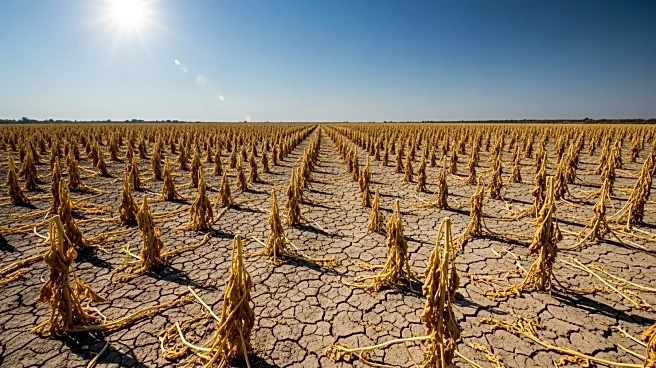What's Happening?
Sudan is experiencing a severe humanitarian crisis as ongoing armed conflict has devastated the country's agriculture sector. According to the United Nations, approximately 24.6 million Sudanese are facing severe food insecurity, with 637,000 people enduring famine-like conditions. The World Health Organization has confirmed famine in parts of the country. The conflict, which began in 2024, has spread into key grain-producing regions, significantly reducing arable land. The Gezira agricultural scheme, Sudan's largest irrigated farming zone, has suffered extensive damage, with infrastructure, irrigation facilities, and farm machinery destroyed. Local authorities estimate the conflict has caused damages between 15 billion and 20 billion U.S. dollars. Despite a reduction in fighting in some areas, recovery efforts are hampered by a shortage of funds, leaving farmers unable to resume production.
Why It's Important?
The situation in Sudan highlights the severe impact of conflict on food security and economic stability. The destruction of the agriculture sector, once the backbone of Sudan's economy, has plunged nearly half of the population into unprecedented hunger. This crisis not only affects Sudan but also has broader implications for regional stability and international humanitarian efforts. The inability to repair critical infrastructure and resume agricultural production exacerbates the risk of prolonged famine, potentially leading to increased displacement and migration. The international community faces pressure to provide aid and support recovery efforts to prevent further deterioration of conditions.
What's Next?
Efforts to address the humanitarian crisis in Sudan will likely involve increased international aid and intervention. The focus will be on repairing damaged infrastructure and restoring agricultural production to alleviate food insecurity. Local authorities and international organizations may collaborate to secure funding and resources necessary for recovery. Additionally, monitoring the conflict's progression and its impact on key agricultural regions will be crucial in planning effective responses. The return of displaced families and the rebuilding of communities will be essential steps in stabilizing the region.
Beyond the Headlines
The crisis in Sudan underscores the complex interplay between conflict, economic stability, and food security. Long-term implications may include shifts in regional power dynamics and increased international involvement in peacekeeping and humanitarian efforts. Ethical considerations arise regarding the responsibility of the global community to intervene and support vulnerable populations. The situation may also prompt discussions on sustainable agricultural practices and resilience in conflict-affected areas.









